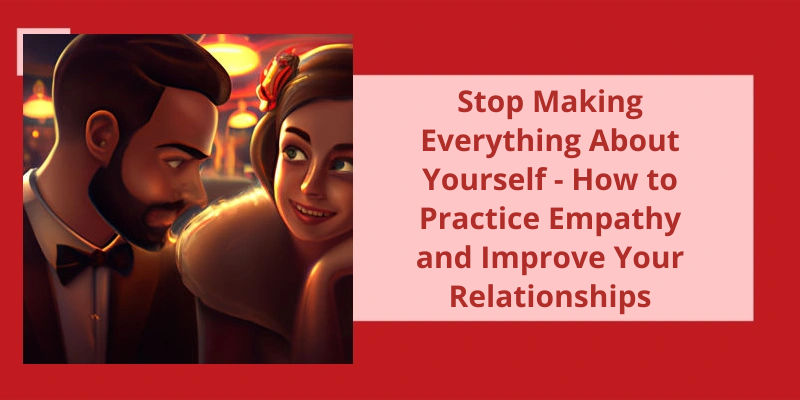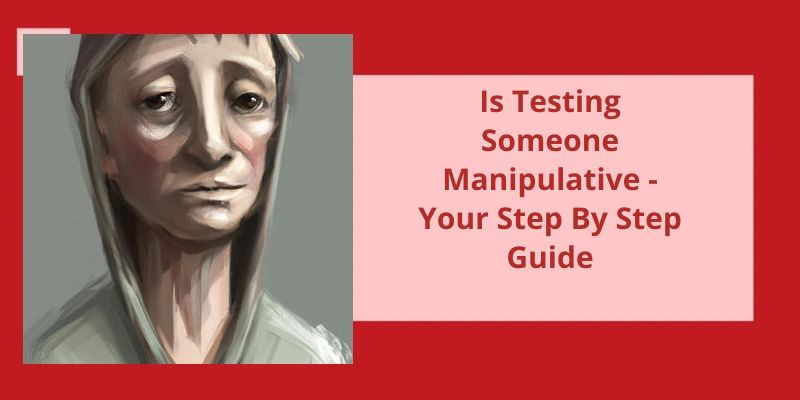In a world that often emphasizes individualism and self-promotion, it can be easy to fall into the trap of making everything about yourself. Whether it's in personal conversations or professional environments, the desire to share our own thoughts and experiences can overpower our ability to truly listen and engage with others. However, this kind of self-centered communication can be harmful to relationships and prevent us from learning and growing. So how do we stop talking about ourselves and start listening instead? It starts with being aware of whose story is being told, actively looking for what we can learn rather than what we can say, and asking probing questions to encourage deeper conversation. And when we do talk about ourselves, it's important to keep it brief and avoid using the words "I," "Me," and "My" too frequently. By practicing these habits, we can become better listeners, strengthen our relationships, and develop a more empathetic and nuanced understanding of the world around us.
How Do You Stop Making It All About You?
When you make everything about yourself, it can be difficult to connect with others and build meaningful relationships. It’s important to recognize that everyone has their own perspective and experiences that shape their worldview, and being able to empathize with others can go a long way in improving your relationships. Practice active listening and truly trying to understand others perspectives rather than only focusing on your own.
Another way to shift your focus away from yourself is to engage in activities that benefit others. Volunteering, participating in community events, or even just checking in on a friend who may be going through a tough time can help you feel more connected to the world around you and less consumed with your own problems.
Part of making everything about yourself may stem from a need for control or a fear of vulnerability. Learning to relinquish control and embracing vulnerability can be scary, but can also lead to personal growth and deeper connections with others. Practice being open and honest with others about your thoughts and feelings, and be willing to take risks and try new things.
Mindfulness and self-reflection can also be helpful in breaking the cycle of making everything about yourself. Take time to check in with yourself regularly and assess your thoughts and behaviors. Ask yourself if you’re focusing too much on yourself and how you can redirect your attention towards others. Meditation and journaling can be helpful tools in this process.
Finally, seek support from a therapist or counselor if you’re struggling with making everything about yourself. They can help you identify underlying issues and provide strategies for shifting your focus towards a more balanced perspective. Remember, it takes time and effort to rewire your thought patterns, but with patience and persistence, it’s possible to break free from the cycle of self-absorption.
The Effects of Making Everything About Yourself on Your Mental and Emotional Health
Constantly centering everything around oneself can lead to negative effects on one’s mental and emotional health. It can lead to an increase in narcissism, anxiety, and feelings of loneliness or isolation. It’s important to maintain a healthy balance of caring for one’s own needs while also considering others and their perspectives.
It can be hard to navigate relationships with people who make everything about themselves. While it may be easy to dismiss their behavior as simply selfish or attention-seeking, it’s important to recognize the underlying feelings that drive this behavior. In many cases, people who make everything about themselves are struggling with deep-seated feelings of loneliness and abandonment, and using this behavior as a coping mechanism to feel seen and heard. Understanding this can help us approach these individuals with greater empathy and compassion.
What Does It Mean When You Make Everything About Yourself?
They may have a deep-rooted fear of rejection, which can lead to a constant need for validation and affirmation from others. Making things about themselves is their way of ensuring that they’re noticed and appreciated by their peers, even if it’s not always warranted. Unfortunately, this can often lead to social isolation and difficulty forming meaningful connections with others.
This kind of self-centered behavior can also be a symptom of a deeper psychological issue, such as narcissism or borderline personality disorder. These conditions stem from a distorted sense of self-importance and an inability to empathize with others. Those who suffer from these disorders may make everything about themselves as a way to fulfill their need for adoration and admiration from those around them.
It’s important to note that making things about oneself isnt always a negative behavior. Personal growth and self-reflection require a certain level of focus on oneself. However, theres a fine line between healthy self-focus and self-absorption. Those who make everything about themselves may struggle to balance their own needs with the needs and desires of others, which can result in diminished relationships and professional setbacks.
Ultimately, the best way to combat this behavior is to seek help from a licensed therapist or mental health professional. Through therapy, individuals can learn to recognize the underlying causes of their behavior and develop strategies for managing it in a more constructive way. This may involve cultivating self-awareness, practicing empathy and compassion, or developing healthier communication skills.
Making everything about oneself can be a destructive behavior that can lead to social isolation, relationship problems, and other negative outcomes. It’s important to be honest with oneself and seek help if this behavior is getting in the way of personal growth and happiness. With the right support and guidance, it’s possible to develop healthier coping mechanisms and more meaningful connections with loved ones.
Learning to be true to yourself can be a lifelong journey. It involves understanding the beliefs and limitations you’ve internalized, letting go of negative self-talk, and learning to focus on your strengths. It also requires you to stop caring about the opinions of others and be open to change. Most importantly, being yourself means being vulnerable and expressing yourself authentically. Here are some tips and strategies that can help you stay true to yourself and lead a fulfilling life.
How to Always Be Yourself?
Being true to yourself is easier said than done. With the pressure of society, we often find ourselves conforming to the standards set by the people around us. It’s essential that we know who we’re and what we stand for to be able to stay true to ourselves. You can do this by taking the time to know yourself. Understand your values, beliefs, and principles. Write them down and keep them as a reminder of who you are.
Negative self-talk can devalue your worth and prevent you from being yourself. It’s important you recognize and let go of it. Identify the root cause of these thoughts and try to eliminate them. It may be a belief about yourself that’s been ingrained in you from past experiences. You can free yourself from these limiting beliefs by identifying them and replacing them with positive affirmations.
Embrace your strengths! Focusing on your strengths instead of your weaknesses can make all the difference. Keep growing your strengths and find ways to use them in your daily life. Celebrate yourself and each new accomplishment.
Don’t let the past define who you are. It’s easy to get caught up in the past, but it’s essential to move on. We all have experiences that have shaped us, but it’s important to remember that they don’t define us. Take what you”ve learned from your past and use it to shape your present.
It’s hard not to care about what others think, but it’s crucial that you focus on your own opinion of yourself. Recognize that everyone has different values, opinions, and beliefs. Be mindful of what you internalize.
Change is constant, and it’s essential to be open to it. Keep an open mind when new opportunities arise. Being rigid can prevent personal growth. Embrace new experiences and challenges, they’re an excellent opportunity for growth.
Last but not least, it’s essential to be vulnerable and express yourself. We’re all unique individuals trying to navigate the world in our way. Let your personality and unique traits shine. Share your ideas and experiences without fear of judgment. Take the time to connect with yourself, and you’ll find it easier to connect with others.
Understanding what it means to make something about oneself is crucial in developing healthy and balanced relationships, both personally and professionally. It requires self-awareness and an ability to understand and respect the perspectives of others. In this article, we will discuss the impact of making something about oneself and explore ways to approach situations in a more collaborative and inclusive manner.
What Does It Mean to Make Something About You?
Individuals who make everything about themselves tend to have a self-centered mindset where they prioritize their needs, opinions, and desires above all others. Their actions and words often revolve around gaining attention, recognition, and validation from others. This behaviour can be detrimental to personal relationships as it creates an imbalance where the other persons voice and feelings aren’t acknowledged or considered.
Not only does this behaviour affect personal relationships, but it can also impact professional ones. Individuals who make everything about themselves in a workplace can create a toxic environment where colleagues feel undervalued and unappreciated. In these situations, teamwork and collaboration become secondary to the persons need for recognition and status.
Making everything about oneself is often rooted in insecurities and a lack of self-awareness. When individuals don’t feel confident enough in themselves, they seek attention and validation from others to fill that void. However, this cycle only reinforces the insecurity as the person becomes reliant on external sources for their happiness and self-worth.
On the other hand, making something about oneself can also be a positive act of self-care and self-expression. When individuals prioritize their needs and interests in a healthy way, they can improve their mental and emotional well-being. It can be a way of asserting boundaries and communicating ones unique identity to others.
Ultimately, the difference between positive and negative behaviours lies in the intentions behind them. It’s essential to be mindful of our actions and their impact on others, as well as examining the motivations behind them.
The Psychological Factors Behind a Self-Centered Mindset
Self-centered mindset can be attributed to various psychological factors, such as past experiences that led to an individual prioritizing their own needs, feelings of insecurity that fuel a need for constant validation, and a lack of empathy for others. These factors can lead to a person becoming self-absorbed and focused solely on their own needs and desires, often at the expense of others.
Source: What does ‘making everything about you’ mean …
How Do I Stop Not Being Myself?
It’s easy to fall into the trap of being someone youre not, especially in todays society where there’s so much pressure to conform. But the good news is that there are many ways you can stop not being yourself and start living the life you want. One of those ways is to try eating something you don’t like. This may seem like a small thing, but it can have a big impact on how you see yourself and the world around you. By stepping outside of your comfort zone and trying new things, you can begin to discover who you really are and what you truly enjoy.
Another way to stop not being yourself is to explore a new genre of book or T.V. show. By exposing yourself to new ideas and perspectives, you can expand your mind and gain a deeper understanding of the world. This can help you to feel more comfortable in your own skin and to express yourself more freely.
If youre struggling to be yourself, try falling in love with the least likely place on your list. This could be a hobby or activity that you never thought youd be interested in, or a place youve never considered visiting before. By letting go of your preconceptions and embracing the unexpected, you can find new experiences and opportunities to be yourself.
Creating differently is another effective way to stop not being yourself. Whether youre an artist, writer, musician, or just someone who loves to express themselves, trying new and unconventional approaches can help you to tap into your true self and discover new depths of creativity.
Using your non-dominant hand is another great way to break out of your comfort zone and stop not being yourself. By doing familiar activities with your non-dominant hand, you can challenge your brain in new ways and gain a greater sense of self-awareness and confidence.
Wearing a different colour is a simple but effective way to start expressing yourself more authentically. This can be something as simple as switching up your usual wardrobe with a bold new piece or trying out a new makeup look.
Finally, if you really want to stop not being yourself, try doing something youre not good at. This might sound counter-intuitive, but it can actually be a great way to discover new interests and talents. By embracing your weaknesses and trying new things, you can begin to see yourself in a more positive light and gain a greater sense of self-confidence.
Surrounding Yourself With Supportive People: Building Relationships With People Who Accept and Appreciate You for Who You Are Can Help You Feel More Comfortable in Your Own Skin.
Creating positive connections with people who value and support you for who you’re is essential for boosting your confidence and overall well-being.
Embracing who you’re and living life on your own terms can be incredibly empowering, but it’s not always easy. Despite the many platitudes out there encouraging people to “just be themselves,” there are often societal pressures and expectations that can feed into feelings of self-doubt and anxiety. Nevertheless, staying true to your authentic self can help you to build confidence, resilience, and a greater sense of purpose in life. In this article, we’ll explore what it means to always be yourself and offer some practical tips for how to live this principle in your daily life.
What Does Always Be Yourself Mean?
Always be yourself means embracing your unique talents, interests, and personality traits, and owning them fully. It’s about living authentically and honestly, without pretending to be someone you’re not. This can be a challenging journey, especially in a world that often pressures us to conform to certain ideals or standards. However, when we stay true to ourselves, we’re able to form deeper connections with others by being genuine, and we can find true fulfillment in our lives.
Another aspect of always being yourself is knowing your own limitations and boundaries. It’s important to know what you’re willing to tolerate and what you’re not, and to stick to these boundaries even when others try to push past them. This can mean saying no to things that don’t align with your values or goals, or setting limits for how much you’re willing to compromise in certain situations.
It’s an ongoing journey that requires self-awareness, confidence, and a willingness to stand up for what you believe in. By living authentically, we can find deeper meaning and purpose in our lives, and inspire others to do the same.
Conclusion
In conclusion, it's important to realize that conversations are a two-way street. While it's natural to want to share our own experiences and thoughts, it's crucial to also actively listen to and care about what others have to say. By being mindful of whose story is being told, listening for the story, asking probing questions, and keeping our own anecdotes brief, we can create more meaningful and fulfilling interactions with those around us. Remember, conversations are a valuable opportunity for learning and growth, not just a platform for personal validation. By shifting our focus away from ourselves, we can build deeper connections and understanding with those around us.






